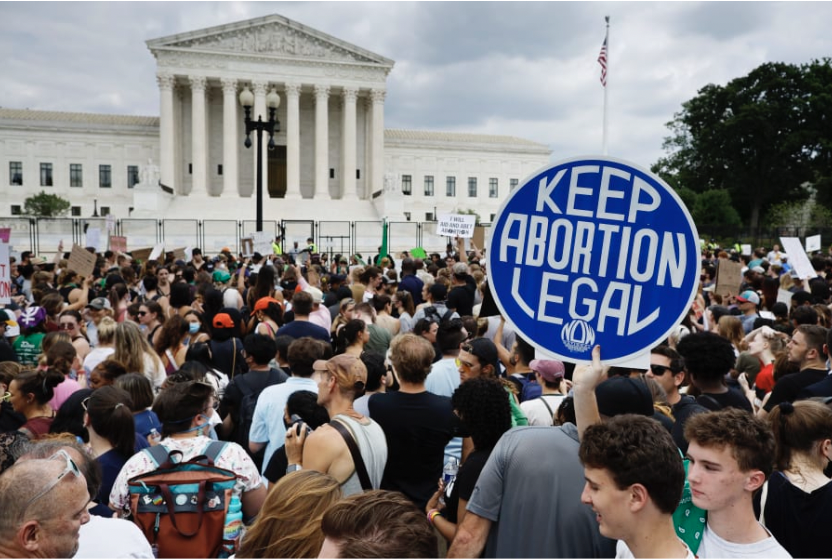The right to freely exercise religion, listed as one of the first rights in the First Amendment, is undoubtedly a bedrock principle of American constitutional law. What happens, then, if a group of individuals were to willingly execute a contract restricting themselves to a certain set of religious rules? A case recently appealed to the Supreme Court, Church of Scientology International v. Bixler (2022), dealt with this very question. The Respondents were a group of women, including Chrissie Carnell Bixler and two Jane Doe’s, who sued for alleged sexual assault by a church member, Daniel Masterson. However, the women originally signed a contract agreeing to resolve any disputes by arbitration within their church and its rules of procedure. Later, they left the faith, and were sued by the Church in order to bind them to the agreement. The Church claimed that the arbitration agreement is an enforceable contract—requiring them to abide by Scientology rules, regardless of faith. The California Court of Appeal, however, sided with the Respondents to not enforce the arbitration agreement, on the grounds that their change in beliefs would free them of their contractual obligations under the free exercise clause of the First Amendment. [1]
Read MoreOn June 24, 2022, with the case Dobbs v. Jackson Women’s Health Organization, the U.S. Supreme Court overturned its 1973 ruling in Roe v. Wade, setting off a cascade of abortion bans in 26 states. [1] However, lawmakers in several states, such as Arkansas, South Dakota, Texas, and Missouri, are now considering even further bans that would prevent women from traveling to obtain an abortion in a state where it is legal. Such bans could also potentially outlaw anyone from “aiding and abetting” travels for abortion purposes. [2] When reviewing the Constitution and subsequent Supreme Court and lower court decisions, it is clear that these laws are unconstitutional. Out-of-state abortion bans do not have legal standing due to protections by the Commerce Clause and the Privileges and Immunities Clause of the Constitution, as interpreted by various courts.
Read MoreThe abusive conduct of private foreign investors is of growing concern for our globalized economy. A look at the applicability of the 1969 Vienna Convention on the Law of Treaties (VCLT)—the legal framework that regulates interstate treaties—reveals it to enable the creation of “imbalanced” investment agreements which neglect to regulate private conduct. The global interplay of corporations and states has the potential to result in corporate encroachment on concerns related to intrastate human rights—and fixing this discrepancy is critical to ensuring equity under international law.
Read MoreThe adjacency of a given wetland to a navigable body of water is not a concept commonly considered. However, the precise definition of this concept is one that could impact the U.S. Environmental Protection Agency’s (EPA) regulatory ability to protect public waters from contamination, pollution, and overall degradation for decades to come. In 2022, the Court announced they would hear a ground-breaking environmental case, Sackett v. Environmental Protection Agency (2022), which directly questions whether “adjacent wetlands” are protected by the Clean Water Act (CWA). [1]
Read MoreOn June 21, 1971, the Supreme Court held in Bivens v. Six Unknown Named Narcotics Agents that an implied right of action existed against federal officers for violation of one’s Fourth Amendment rights. [1] According to the court, the Constitution implied that individuals had a right to sue for monetary damages if they could prove that a federal official, acting under federal orders, subjected them to an unreasonable search or seizure. Bivens actions, then, provide an avenue for victims of constitutional violations to receive monetary redress for their grievances. In the decade following the Bivens decision, the Court expanded the precedent to apply to infringements on the Fifth and Eighth Amendments, including individual’s rights against self-incrimination and cruel and unusual punishment, respectively, by rewarding damages in two other cases: Davis v. Passman (1979) and Carlson v. Green (1980).
Read MoreMuslims in India, the world’s largest democracy and second most populous nation, are currently facing a genocidal crisis. Constituting approximately 14 percent of India’s population, compared to the nation’s Hindu majority of 80 percent, Muslims living under the rule of India’s far-right, Hindu nationalist Bharatiya Janata Party (BJP), led by Prime Minister Narendra Modi, have become direct targets of government measures put in place to prevent a “demographic imbalance,” in which Hindus no longer make up a majority of India’s population. These measures include religious leaders calling for mass killings, attacks on Muslim-owned businesses, and a series of laws and policies that outrightly target and exclude Muslims from Indian society. [1]
Read MoreDuring her confirmation hearings in March 2022, Justice Jackson introduced herself to Congress as an originalist. [1] Legal originalism is a doctrine of judicial interpretation that follows the Constitution as it was initially intended to be understood at the time it was written. This doctrine is often associated with the Court’s more conservative justices, such as Justices Antonio Scalia and Clarence Thomas, who have used it to argue against abortion and gun rights. However, under Justice Jackson’s interpretation, originalism has taken on a new form—one that is lauded for its progressivism.
Read MoreDuring the civil rights protests of the 1960s, many pieces of legislation were passed to better secure rights for minority groups. Such legislation included the Civil Rights Act of 1964 and the Voting Rights Act of 1965. Recently, however, civil rights legislation has come under attack with the Supreme Court’s decision in Cummings v. Premier Rehab Keller P.L.L.C (2022). In Cummings, the Court ruled that emotional distress damages—obtainable through Title VI of the Civil Rights Act—are not recoverable. [1] The Court’s ruling erects new barriers in the paths of victims who simply want to feel whole after being discriminated against. Thus, the crux of civil rights legislation is suppressed as victims will not be able to seek justice even though “emotional injury is often the primary, and at times the only, harm caused by discrimination.” [2]
Read More“Weeping in the wind, the orphan of Asia / There is scarlet mud on his yellowish face / There is White Terror in his dark pupils / And there is West Wind whistling the sad song in the East.” As Lo Ta-yu lamented in his song “The Orphan of Asia,” Taiwan in the 1980s suffered an identity crisis, drifting between the Nationalist Party’s urge to reclaim mainland China and the inhabitants’ will to put down roots on the island—all amidst the Chinese Communist Party’s (CCP) intensifying efforts to subjugate the island. An abandonment sentiment began to brew, and today, it has amplified in more concrete ways: the denied entry to the United Nations (UN), the constant terror of an imminent Chinese invasion, and the lack of recognition from the international community.
Read More








